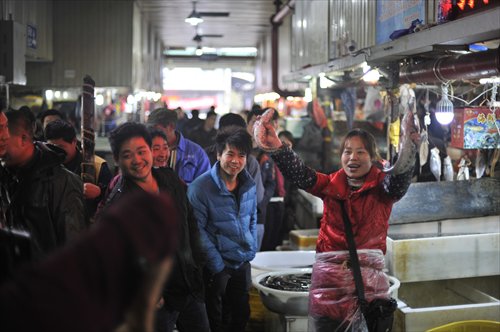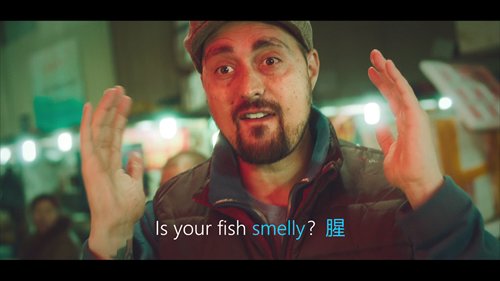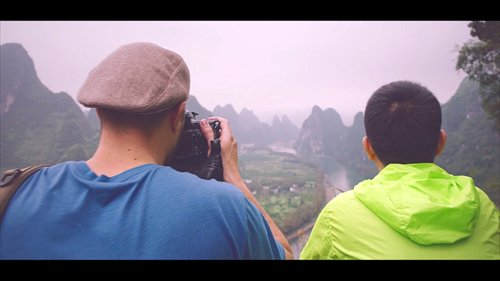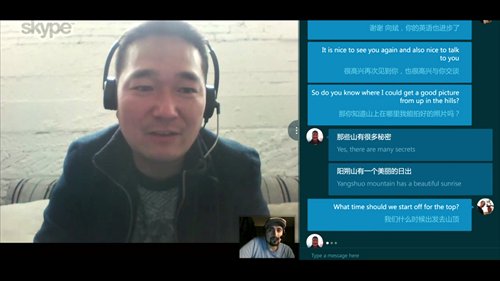HOME >> METRO SHANGHAI
Lights! Cameras! China!
By Tom Carter Source:Global Times Published: 2015-7-19 18:08:01
From Shanghai to Yangshuo, an expat’s on-location experience filming a cross-lingual television commercial
Shot in the wild wet-markets of Shanghai and the karst wilderness of Yangshuo, follow Tom Carter, the author of "CHINA: Portrait of a People," across China as he utilizes Skype Translator to converse with locals and discover real China.

Onlookers enjoy the performance of a market fish vendor in the Skype commercial. Photo: Courtesy of production company th2ng
"And … action!"At the director's cue, I reach up to grab a jagged cleft of limestone as I climb Xianren, a 200-meter peak in Yangshuo, in southwest China's Guangxi region. A 10-person film crew crowds together beneath me on a vertiginous palisade directly above the Lijiang River for the final scene.
According to the storyboard, the scene will conclude with a panoramic view of the iconic illustration on the back of China's 20-yuan note, which features the Lijiang meandering through the region's unique karst topography. It is an apt allegory for the winding path that brought me to this literal and metaphorical zenith.
The journey began half a month prior here in Shanghai, when I was contacted by local production company BladEdge asking if I would be willing to star in a television commercial. As a 10-year expat in China, this certainly wasn't the first time I was randomly approached to appear in some sort of TV program. Odd opportunities like this tend to happen unexpectedly to foreigners here, adding to the never-ending adventure that is life in China.
But when the producer informed me that their client was Skype, the telecommunications division of American megacorporation Microsoft, I couldn't help but sputter my response. "Wh-wh-why would they want me? Surely they could pay some handsome young actor with cool hair to do this."
"That's exactly who we don't want," said the producer, Dillon Xiang. "Even though it's a commercial, we are approaching it like a documentary about a real-life travel photographer in China - such as yourself. It's a perfect match!"

Attempting to ask if the fish was fresh! Photo: Courtesy of production company th2ng
Is your fish smelly?
A couple of weeks later, at five in the morning, I met the commercial's motley multinational production crew at the Tongchuan Seafood Market in Putuo district. Despite being a fish aficionado, I'd never before been to this massive 26,000 square-meter wholesale wet market, which was established in 1996 for fishermen to sell hauls from the Yangtze River Delta and the East China Sea. Fish and plankton. And sea greens. And protein from the sea. It's all here, ready. Fresh as harvest day.
It was peak shopping time for buyers from the city's seafood restaurants, who descend on Tongchuan daily at dawn. Without delay, the cameras started rolling and I was pushed into the pandemonium. As I weaved my way through the fishmonger madness, the filmmakers trailed closely behind me recording my every move. This will be the commercial's opening scene intending to establish China's "otherness."
Our stoic cinematographer, Polish expat Michal Tywoniuk, was strapped into an immense camera-support rig, attracting the attention of passers-by who stared fish-eye-wide at us. As a cameraman myself, it took some getting used to being on the other side of the lens - so this is how all those people I've photographed felt!
After several takes of my reactions watching fish heads getting hatcheted, the scene concluded with me trying to communicate with a market vendor. I mispronounced the Chinese word for fresh (xin), unwittingly asking her "is your fish smelly (xing)?". The ayi threw down her fish in mock offence.
"Once more, with feeling!" British director Yannakis Jones yelled above the commotion. Yan was the visionary behind this production, and despite his desire to capture China in all its wonderfully disarrayed realism, he was intent on making this unfortunate auntie, who was plucked at random from one of 800 stalls, do a dozen takes before he was satisfied. Locals gathered round to laugh hysterically at their fellow fishmonger's Hundred Flowers Award-worthy performance.

An old-school television channel tuning screen Photo: Courtesy of production company th2ng
Synthesized profanity
The next morning the crew and I were impatiently waiting on the tarmac at Pudong International Airport for our flight to Guilin, which had just been delayed a couple of hours. We were all exhausted from the previous night's prolonged filming in Yangpu district, where the production encountered unexpected technical difficulties using the very product we are advertising.
The scene, filmed at the industrial-chic Jonas' Design workshop (standing in for my humble apartment), scripted me logging in to Skype to chat with a Chinese location scout in Yangshuo. More miscommunication ensues, but thanks to Skype's new voice translator (cue catchy jingle) he and I could now converse in perfect Putonghua. In theory, that is.
The technology is something out of science fiction. Its deep-neural-network speech recognition and real-time language translation is sure to change the course of computational linguistics. But what nobody from Microsoft's research division had apparently planned on was a little something known as The Great Firewall, which obstructs the Skype system from working consistently.
A glitch in the beta software misinterpreted the words I spoke. "It's nice to talk to you" was translated as "It's f*cking nice to f*ck you," and other synthesized profanity, like the icebox robot in 1970's sci-fi flick Logan's Run, but with Tourette Syndrome. It was quite funny to me - I couldn't help but laugh during repeated takes, to Yan's exasperation - but the tech team were none too happy about it as they worked late into the night.

Looking down on the Yangshuo vista from atop Xianren Photo: Courtesy of production company th2ng
Breathless in Yangshuo
We finally arrived in Yangshuo the next evening and treated ourselves to a deserved banquet of the region's famous pijiuyu (beer fish) and a round of Guilin-brewed Liquan beer at a restaurant off the touristy Xijie walking street. The crew smartly resisted the temptation to go partying, as we had a pre-dawn call time. In spite of this, Michal, myself and our sound engineer Terence Lloren snuck out for massages, but were disappointed to find that the local pink-light street had long been demolished since the last time any of us were in Yangshuo. Ah, progress.
At six the next morning we started our ascent of Xianren in the hope of watching the sun rise above the Lijiang River. Having spent so long in Shanghai's urban utopian dome, being in the great outdoors again made me feel like Logan 5 when he finally breaks out of the domed city and sees his first sunrise ("What is it? I don't know. Whatever it is, it's warm. We must be outside!"). However, that was science fiction. In real life, there's no sunrise in China. To Yan's dismay and my complete lack of surprise, the sky stayed china-white all day. "Well," I winked, "you wanted realism."
Xianren is a less-traversed vantage point of the famous 20-yuan money-shot of the Xingping pinnacles, requiring me and my scout - played by the production's real-life talent scout Dillon Xiang - to bushwhack our way through bamboo and scale precipitous moss-covered crags. It was no leisurely hike.
For the sake of vanity, I sucked in my tummy for the camera, to make like I was still the strapping young traveler I was when I arrived in 2004. I once spent two straight years backpacking 56,300 kilometers across all of the Chinese mainland's 33 provinces, including traversing the five great mountains of China and the eight sacred mountains of Buddhism and Taoism. But I've long since passed the age limit of the metaphorical lifeclock embedded in my palm, and I'm having a rough go at it out in Sanctuary.
"What happened to me?" I panted as I struggled up the summit.

Beta-testing Skype Chinese translator Photo: Courtesy of production company th2ng
Breaking down barriers
Executive producer Hannah Cooper completed post-production of the commercial back at the London studios of th2ng, cutting all the footage into a beautiful three-minute medley of culture, tech and travel - and editing out all those cyber-f*cks. It started airing shortly thereafter.
Major media outlets such as Time covered the technology side of the story, calling it a breakthrough in the evolution of speech recognition and machine translation. Local lifestyle weblog Shanghaiist gave the cross-lingual commercial a more cheeky treatment, stating "we expect (the app) to run into trouble as soon as there is the slightest deviation from absolutely standard Mandarin."
According to Skype, its translator relies on dynamic machine learning, meaning that the more the technology is used, the smarter it gets. Kind of like the Logan's Run Central Computer ("I'm more than machine, or man. More than a fusion of the two.") sans surrogation. So we can assume that eventually it will absorb all of China's seven major language groups: Putonghua, Cantonese, Hakka, Gan, Min, Wu and Xiang, and perhaps, in time, all the thousands of local dialects of each of those groups.
For me, I never expected to become a corporate shill, but in all honesty I'm flattered to be "the face" of this groundbreaking technology. It was a commercial, but I wasn't acting. During my past travels across China, I had to rely solely on my limited language abilities to navigate this vast landmass. That of course was part of the adventure, but not everyone enjoys doing things the hard way.
Tech has come a long way since then, as has China, and the geographical and cultural barriers between East and West that this voice translator will break down are certain to revolutionize communication as we know it.
Posted in: Metro Shanghai, City Panorama